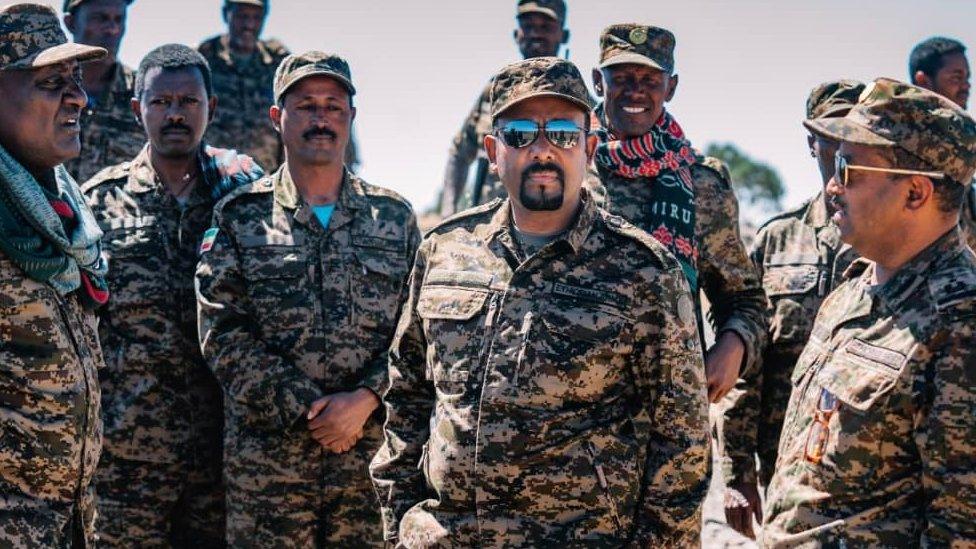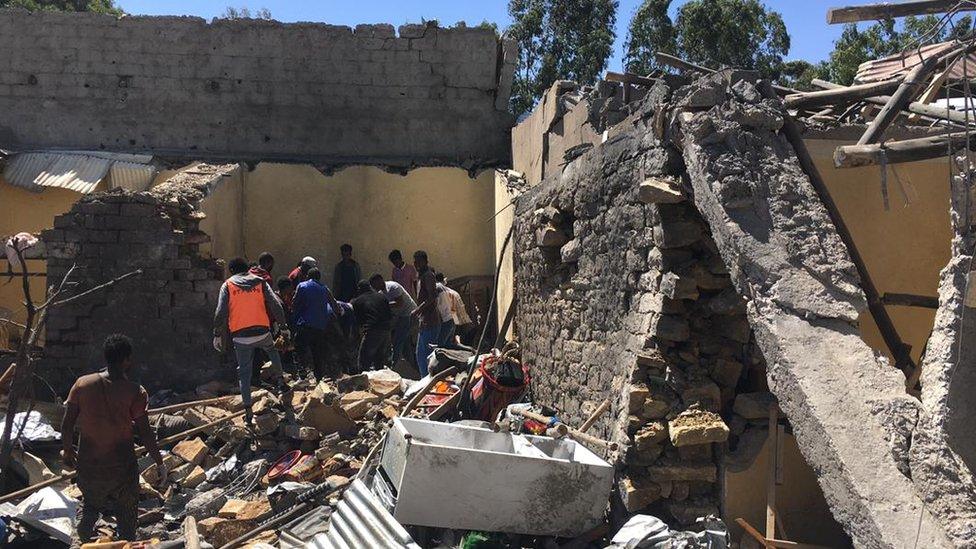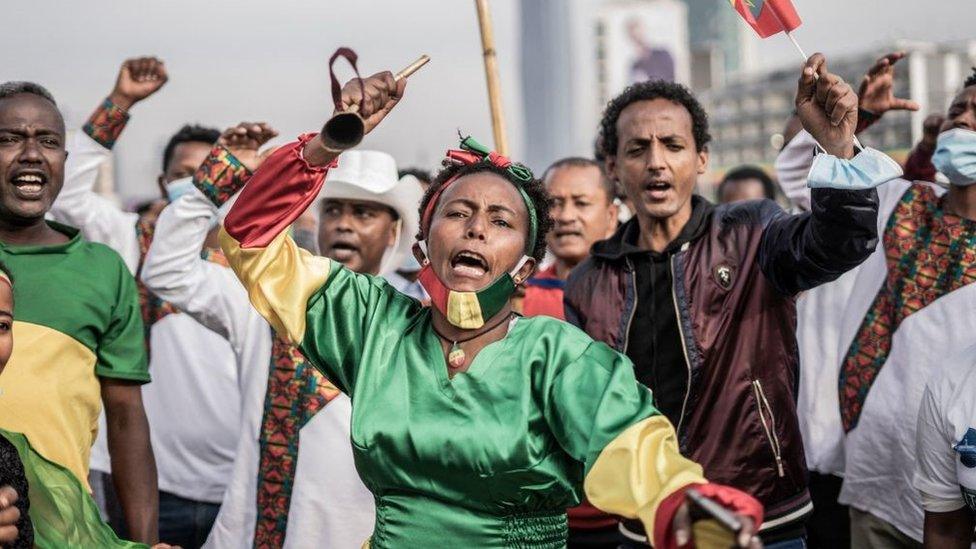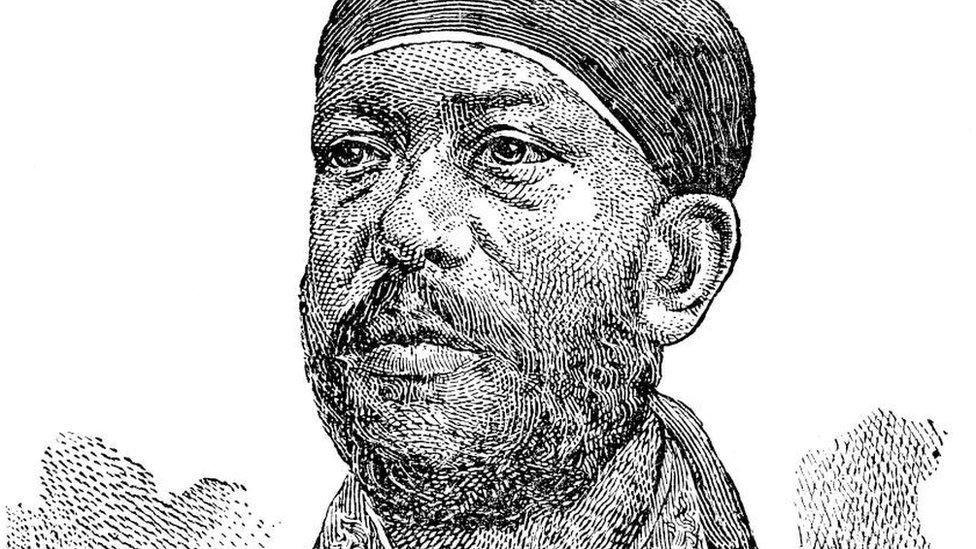Ethiopia civil war: How PM Abiy led fight-back against rebel advance
- Published

The PM was pictured with commanders on the front line
Ethiopia's Prime Minister Abiy Ahmed evoked memories of the country's kings and emperors by going to the front lines to lead a dramatic fightback against Tigrayan rebels who had threatened to overthrow him.
In extraordinary scenes for a man who was declared the 100th winner of the Nobel Peace Prize in 2019, Mr Abiy was videoed and photographed in military fatigues, walking through bushy and mountainous terrain, scanning the horizon with a binoculars and addressing soldiers under a clump of trees.
"Those who want to be among the Ethiopian children, who will be hailed by history, rise up for your country today. Let's meet at the front," he said.
Kjetil Tronvoll, a professor in conflict studies at the Oslo New University College in Norway, said there was no doubt that Mr Abiy's decision helped turn the tide against the Tigray People's Liberation Front (TPLF).
"Though the photos suggest that he was close to the front lines and not on the actual battlefield fighting, his decision paid off, " he said.
"It boosted the morale of his generals, led to a surge in Ethiopian nationalism, saw national heroes like Haile Gebrselassie come out in support of the war effort, and thousands of people lined up to join the army and the Amhara [ethnic group's] militias."
Drone attacks
The setbacks the TPLF faced were huge. Its fighters had been around Debre Birhan town, about 130km (80 miles) from the capital, Addis Ababa, before being forced to go back about 400km to Weldiya. This means the rebels lost key towns on the A2 highway that links their stronghold of Tigray to the federal government's seat of power.

Mekelle, the capital of Tigray, has been hit by drone strikes
Prof Tronvoll said that while Mr Abiy rallied his troops on the ground, drones - reportedly obtained from China, Turkey and Iran - played a far greater role in forcing the TPLF to retreat: "China's Wing Loong II allegedly proved to be the drone with the highest military capacity to take out tanks, heavy artillery and to drop bombs against foot-soldiers in open terrain."
At the same time, the government resisted US and European Union (EU) pressure to negotiate a ceasefire, and portrayed Western powers as TPLF allies - a view also expressed by Mr Gebrselassie, an Ethiopian running legend.
"We have seen how Iraq, Syria, Yemen and Libya have been destroyed or disintegrated. But Ethiopia is a country with more than 120 million people. So any attempt to destabilise this country could backfire on them," he told state media.
"I know our African brothers and sisters are supporting us and we have been fighting colonialism together for centuries, external."
Prof Tronvoll said Mr Abiy had set the tone for such rhetoric to win the support of African governments, as well as other countries that were rivals of the West: "At the start of the war, Mr Abiy called the TPLF a junta against whom he was waging a law-enforcement operation.
"But he then embraced the pan-African narrative by calling the TPLF a proxy for imperialist forces, and he was fighting for Ethiopia's glory, like the emperors of the past."
Popularity boosted
In November, Mr Abiy drew parallels between the TPLF's attempt to overthrow his government to the Italian invaders who were defeated in the famous Battle of Adwa in 1896 by the army of Emperor Menelik II, the founder of modern-day Ethiopia who came from the Amhara ethnic group.

Tens of thousands of Ethiopians have rallied in the capital Addis Ababa in support of the army
"My fellow Ethiopians here and in the diaspora, your role in telling the world the truth is commendable. In unity, we can overcome the existential threat this ancient nation is confronted with by forces far and near. As children of #Adwa, we will carry #Ethiopia #ResilientlyOnwards," he tweeted, external.
The TPLF was a guerrilla movement which gained power in Ethiopia in 1991. It dominated the government until 2018, when Mr Abiy took office following huge demonstrations against its repressive rule. It then retreated to its stronghold of Tigray, from where it launched a rebellion last year following a massive fall-out with Mr Abiy over his reforms.
UK-based Horn of Africa analyst Abdurahman Sayed said Mr Abiy earned the respect of many Ethiopians by going to the front lines to spearhead the resistance as his popularity had been faltering as the rebels advanced.
"By abandoning his official residence and joining his army, Mr Abiy sent the message that he was prepared to die for Ethiopia, if necessary," he said.

Emperor Menelik II's victory in the Battle of Adwa in 1896 is commemorated each year in March
"He is quite obsessed with the history of Ethiopia's kings, and he once told his audience that his mother predicted he will rise to become the seventh king. The kings used to lead their armies into battle, and he has done something similar."
Prof Tronvoll said Mr Abiy's actions were unprecedented for a Nobel Peace laureate - an honour bestowed on him in 2019 for ending hostilities with Eritrea and introducing political reforms in Ethiopia after decades of state repression.
"Barack Obama won the prize after he became US president, and waged a drone war in Afghanistan, but he sat in the war room of the White House. Mr Abiy is the first one to go close to the front lines," he said.
Battle for key road
Mr Abiy initially went in late November to the eastern front, where special forces and militias from Ethiopia's Afar region had already inflicted heavy losses on the TPLF.


"The Afars are the next-door neighbours of the Tigrayans. Traditionally, they are considered to be warriors. Almost every Afar man would have a gun from the age of 15. They mounted a strong resistance against the TPLF, and for the first time Afar women took part in fighting," said Mr Abdurahman.
"It showed the depth of anger towards the TPLF because of the atrocities its fighters had committed in Afar when they first tried to break out of Tigray about six months ago."
Mr Abdurahman regards this as a turning-point in the war, as it thwarted the TPLF's attempts to reach the border with Djibouti: "Ethiopia is landlocked, and the port in Djibouti is its economic lifeline.
"If the TPLF took control of the road leading to the border, Ethiopia's economy would have been brought to its knees, no goods would have reached Addis Ababa, and the chances of the capital falling to the Tigrayans would have been greater."
Mr Abiy returned from the front lines after about two weeks, only for his office to announce this week that he has gone back to lead the military in capturing more territory in the Amhara region. For its part the TPLF said it had retaken the region's historic church town of Lalibela.
Exploring the churches carved from rock
For Prof Tronvoll, the Ethiopian leader may have managed to hold on to power, but he has tarnished his global image: "The ultimate objective of a Nobel Peace laureate should be peace, but Mr Abiy has repeatedly rejected calls for a ceasefire, and his troops have committed widespread atrocities."
But Mr Abdurrahman said Mr Abiy had no choice but to fight as the TPLF had been determined to regain power through force.
"We don't know for how long this war will carry on and how it will end, but Mr Abiy has shown that he is no pushover."
More on the Tigray crisis: